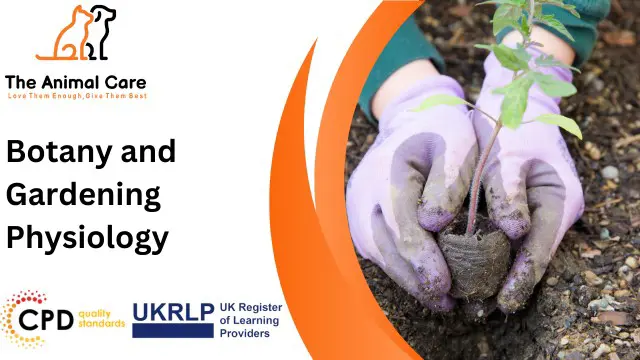
Botany and Gardening Physiology
UKRLP Recognised | CPD Accredited & Certified | Lifetime Access | Free PDF Certificate | 24/7 Expert Tutor Support
The Animal Care
Summary
- Certificate of Completion (PDF) - Free
- Transcript (PDF) - £2.99
- Transcript (Hard Copy) - £7.99
- Certificate of Completion (Hard Copy) - £9.99
- Exam(s) / assessment(s) is included in price
- Tutor is available to students
Add to basket or enquire
Overview
Did you know that plants can communicate with each other? It's true! In this captivating course on Botany and Gardening Physiology, you'll uncover fascinating secrets of the plant kingdom. Explore the fascinating world of plants, from their cellular structure to their evolutionary history. Develop a strong foundation in botany and gardening physiology through theoretical study. Gain in-depth knowledge about plant morphology, anatomy, physiology, genetics, ecology, and more.
Learning Outcomes:
- Understand the fundamental concepts of botany and the diverse forms of plant life.
- Gain knowledge of plant anatomy and the functions of different plant cells.
- Explore the taxonomy and classification systems used to identify and name plants.
- Develop an understanding of plant physiology, including processes like photosynthesis and respiration.
- Study the reproductive mechanisms and embryology of plants.
- Gain insights into plant genetics, evolution, and their relationship with the environment.
- Explore the ecological interactions between plants and their surroundings.
CPD
Course media
Description
Delve into the captivating world of plants with our Botany and Gardening Physiology course. This comprehensive program consists of 12 modules, each designed to provide you with a solid understanding of various aspects of botany. From the very basics of plant morphology to advanced topics like plant genetics and ecology, this course covers it all.
Through theoretical study, you will explore the intricate anatomy and cellular structure of plants, uncovering their fascinating adaptations. Learn about plant classification systems and how scientists name and identify different species. Gain insights into the vital processes of plant physiology, such as photosynthesis and respiration, and understand how plants interact with their environment.
Embark on a journey through the evolutionary history of plants, from ancient gymnosperms to the diverse flowering plants that dominate our ecosystems. Explore the captivating field of palaeobotany, studying plant fossils to unlock secrets from the past.
Whether you're a gardening enthusiast, a biology student, or simply curious about the world of plants, this course is perfect for you. Expand your knowledge, develop a deeper appreciation for nature, and unlock new possibilities in your botanical endeavours.
Course Curriculum:
- Module 01: Introduction to Botany
- Module 02: Morphology of Plants
- Module 03: Cell Biology and Anatomy of Plants
- Module 04: Naming Plants and Taxonomic Classifications
- Module 05: Plant Physiology
- Module 06: Embryology of Plants
- Module 07: Plant Genetics and Evolution
- Module 08: Plant Ecology
- Module 09: Cryptograms and Microbes
- Module 10: The Gymnosperms
- Module 11: Angiosperms - The Flowering Plants
- Module 12: Palaeobotany
Who is this course for?
- Biology students seeking a comprehensive understanding of botany.
- Gardening enthusiasts looking to deepen their knowledge of plant physiology.
- Nature lovers interested in exploring the diverse world of plants.
- Science educators and professionals desiring to enhance their expertise in botany.
Career path
- Botanist: £25,000 - £45,000 per year
- Plant Scientist: £28,000 - £55,000 per year
- Horticulturist: £20,000 - £35,000 per year
- Plant Ecologist: £25,000 - £45,000 per year
- Conservation Scientist: £25,000 - £45,000 per year
- Researcher in Botany or Plant Physiology: £25,000 - £55,000 per year
Questions and answers
Currently there are no Q&As for this course. Be the first to ask a question.
Certificates
Certificate of Completion (PDF)
Digital certificate - Included
Transcript (PDF)
Digital certificate - £2.99
Transcript (Hard Copy)
Hard copy certificate - £7.99
Certificate of Completion (Hard Copy)
Hard copy certificate - £9.99
Reviews
Currently there are no reviews for this course. Be the first to leave a review.
Legal information
This course is advertised on reed.co.uk by the Course Provider, whose terms and conditions apply. Purchases are made directly from the Course Provider, and as such, content and materials are supplied by the Course Provider directly. Reed is acting as agent and not reseller in relation to this course. Reed's only responsibility is to facilitate your payment for the course. It is your responsibility to review and agree to the Course Provider's terms and conditions and satisfy yourself as to the suitability of the course you intend to purchase. Reed will not have any responsibility for the content of the course and/or associated materials.





